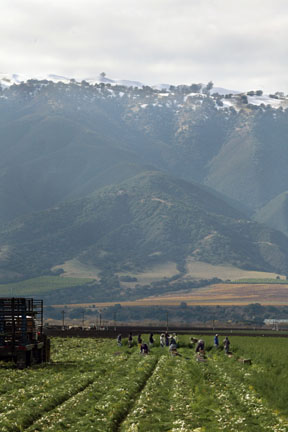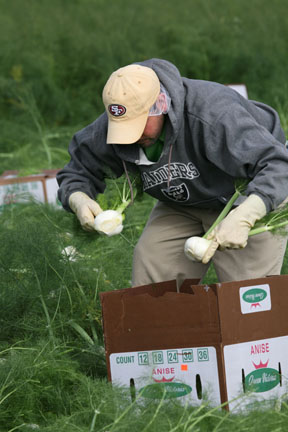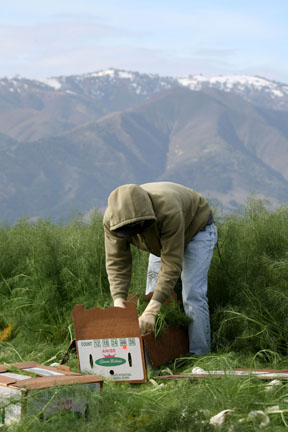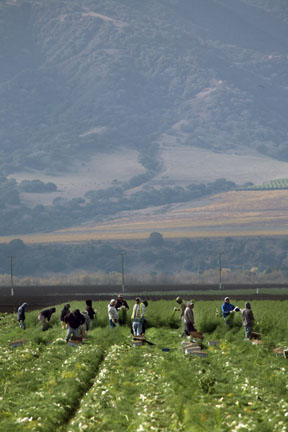From the Open-Publishing Calendar
From the Open-Publishing Newswire
Indybay Feature
Farm Workers Cutting Anise in the Winter
GREENFIELD, CA - 18 DECEMBER 08 - A crew of indigenous farm workers from Mexico cuts and packs boxes of anise in a field in the Salinas Valley. It is so cold that snow is on the peaks of the mountains on each side of the valley.

For more articles and images on farm workers and immigration, see http://dbacon.igc.org/Imgrants/imgrants.htm
Just out from Beacon Press:
Illegal People -- How Globalization Creates Migration and Criminalizes Immigrants
http://www.beacon.org/productdetails.cfm?PC=2002
See also the photodocumentary on indigenous migration to the US
Communities Without Borders (Cornell University/ILR Press, 2006)
http://www.cornellpress.cornell.edu/cup_detail.taf?ti_id=4575
See also The Children of NAFTA, Labor Wars on the U.S./Mexico Border (University of California, 2004)
http://www.ucpress.edu/books/pages/9989.html
http://dbacon.igc.org
Just out from Beacon Press:
Illegal People -- How Globalization Creates Migration and Criminalizes Immigrants
http://www.beacon.org/productdetails.cfm?PC=2002
See also the photodocumentary on indigenous migration to the US
Communities Without Borders (Cornell University/ILR Press, 2006)
http://www.cornellpress.cornell.edu/cup_detail.taf?ti_id=4575
See also The Children of NAFTA, Labor Wars on the U.S./Mexico Border (University of California, 2004)
http://www.ucpress.edu/books/pages/9989.html
http://dbacon.igc.org




Add Your Comments
Comments
(Hide Comments)
The crop needs harvesting and this is what these folks have chosen to do for a living. I am a white middle aged white guy who has spent his fair share in extreme weather doing what it takes to put food on the table. So what is your point about the harvest?
what's his point? does it matter?
what's your problem if you look at farm workers and instantly get defensive?
maybe the point is for you to be appreciative of those who do the work that makes the products you use, especially at this time of year!
what's your problem if you look at farm workers and instantly get defensive?
maybe the point is for you to be appreciative of those who do the work that makes the products you use, especially at this time of year!
I think his point is that there are plenty of people of all races and economic backgrounds that work in inclimate weather, some much worse than depicted here. What about road crews clearing roads in blinding snow, ice and rain? What about emergency service people out there in the middle of the night under those same conditions dealing with accidents or road hazards? Snow on peaks of mountains miles away can't be compared to several feet on the ground that your working in, yet there's no mention of those workers here is there? I do appreciate what the farm workers do, I also appreciate those middle aged white guys, black guys and hispanic guys and whoever else is working in weather conditions far worse than what's being descibed in the original message. Then again, I don't have a specific agenda to put out so this will probably get deleted.
The point of this photo article could be easier understood by reading the links provided, about how the passing of NAFTA/WTO years ago has created a permanent class of landless workers that are perpetually displaced from their native homes (Mexico and points south) and yet are not considered "legal" in the lands where they migrate to for employment (U.S./Canada)..
This isn't really about snow!!
In addition, people in the U.S. should consider the side effects of depending on a group of displaced migrant workers to grow their food, and what synthetic inputs are used in the process of growing plantation style corporate agriculture..
The very same policies of NAFTA/WTO that have displaced the Mexicans and others from their farmlands at home have also driven small farmers in the U.S. off of their lands that are replaced by large corporate agribusiness plantations that rely on disposable low wage migrant labor AND heavy applications of petroleum derived synthetic pesticides, fertilizers, etc... for their yearly crop yield. This results in the migrant farmworkers, regional ecosystem and consumers of the food product ALL beng exposed to various levels of carcinogenic and hormone disrupting toxins found in these synthetic applicants, in addition breeding weaker strains of food crops that are more susceptible to insect plagues, diseases and plant viruses, and creates a dependency on petroleum based synthetic applicants also...
This article is good because it goes beyond the typical "pro-immigrant vs. anti-immigrant" psuedo-debate we see in mainstream media outlets and addresses the source of the crisis everyone is facing, NAFTA/WTO free trade policies increasing poverty and landlessness in Mexico and points south that force migrations of landless workers to the U.S. agribusiness plantations..
Repealing NAFTA/WTO free trade policies (as suggested by Dennis Kucinich AND Ron Paul) and helping Mexico's people reclaim and restore their ejido community farms from the corporations that benefited from NAFTA's land heists would be a far more effective method of slowing the pace of undocumented immigration to the U.S., and helping people in the U.S. in reclaiming their farmlands from industrial agribusiness corporations and restoring smaller farms here also..
Here's some background on NAFTA's crisis in Mexico;
"Corporate Globalization: Standing at the End of the Road
by Ronnie Cummins
Standing at the end of Avenida Madero (Madero Avenue) on the last day of January 2008, a stone throw from the Zócalo or City Center of Mexico City, I am swept along in a sea of thousands of farmers and laborers, carrying signs and banners. Streaming from the historic statue of the Angel of Independence, symbolically setting fire to a decrepit tractor, one hundred and fifty thousand small farmers, teachers, workers, and neighborhood activists are marching to repeal the North American Free Trade Agreement (NAFTA), and end the illegal "dumping" by Cargill, ADM, and Monsanto of billions of dollars of taxpayer subsidized U.S. agricultural crops--beans, rice, sugar, powdered milk, soybeans, and genetically engineered corn--onto the Mexican market.
NAFTA, pushed through in Mexico, Canada, and the U.S. in 1994 over the opposition of the majority of North Americans, is literally driving Mexico's thirty million small farmers and villagers off the land and into the slums of Mexico City, Guadalajara, Monterrey, Tijuana, Juarez, and other cities; or else, following the path of twelve million others before them, across the increasingly dangerous border into the United States to find work. Rural villages in Mexico have become literal economic ghost towns of women, children, and the elderly. In some municipalities, 80-90% of the men and boys are gone, increasingly joined by the young women.
A dark-skinned peasant woman, wearing her kitchen apron, approaches me. I stand out in the crowd, an obvious gringo with my Code Pink anti-war T-shirt and my Organic Consumers Association baseball cap. The farm woman patiently explains to me how NAFTA has broken up her family. Her two sons and her daughter, like millions of other jovenes (young people), she explains, desperate for a living wage, did not want to leave their community or abandon their families, but they had no choice. And now, with the militarized border, so-called illegal aliens, like her children, can no longer take the risk of coming back home to visit. Her sons and daughter, like most other immigrants, send back remesas (money) to help support their families. This twenty-four billion dollar annual lifeline is the only thing standing between Mexico¹s rural population and utter poverty.
Moving up behind the farmers, flanked by banners protesting the imminent sell-off of Mexico's publicly owned electricity and oil industries, union workers and students fill the massive square in front of the National Palace. Mexican workers, whose minimum wage is 1/12 that of the U.S., are already suffering from high prices for electricity and gasoline. But once U.S. and European corporations take over the petroleum and electricity sectors, prices will inevitably skyrocket."
article cont's @;
http://www.commondreams.org/archive/2008/02/12/6994
This isn't really about snow!!
In addition, people in the U.S. should consider the side effects of depending on a group of displaced migrant workers to grow their food, and what synthetic inputs are used in the process of growing plantation style corporate agriculture..
The very same policies of NAFTA/WTO that have displaced the Mexicans and others from their farmlands at home have also driven small farmers in the U.S. off of their lands that are replaced by large corporate agribusiness plantations that rely on disposable low wage migrant labor AND heavy applications of petroleum derived synthetic pesticides, fertilizers, etc... for their yearly crop yield. This results in the migrant farmworkers, regional ecosystem and consumers of the food product ALL beng exposed to various levels of carcinogenic and hormone disrupting toxins found in these synthetic applicants, in addition breeding weaker strains of food crops that are more susceptible to insect plagues, diseases and plant viruses, and creates a dependency on petroleum based synthetic applicants also...
This article is good because it goes beyond the typical "pro-immigrant vs. anti-immigrant" psuedo-debate we see in mainstream media outlets and addresses the source of the crisis everyone is facing, NAFTA/WTO free trade policies increasing poverty and landlessness in Mexico and points south that force migrations of landless workers to the U.S. agribusiness plantations..
Repealing NAFTA/WTO free trade policies (as suggested by Dennis Kucinich AND Ron Paul) and helping Mexico's people reclaim and restore their ejido community farms from the corporations that benefited from NAFTA's land heists would be a far more effective method of slowing the pace of undocumented immigration to the U.S., and helping people in the U.S. in reclaiming their farmlands from industrial agribusiness corporations and restoring smaller farms here also..
Here's some background on NAFTA's crisis in Mexico;
"Corporate Globalization: Standing at the End of the Road
by Ronnie Cummins
Standing at the end of Avenida Madero (Madero Avenue) on the last day of January 2008, a stone throw from the Zócalo or City Center of Mexico City, I am swept along in a sea of thousands of farmers and laborers, carrying signs and banners. Streaming from the historic statue of the Angel of Independence, symbolically setting fire to a decrepit tractor, one hundred and fifty thousand small farmers, teachers, workers, and neighborhood activists are marching to repeal the North American Free Trade Agreement (NAFTA), and end the illegal "dumping" by Cargill, ADM, and Monsanto of billions of dollars of taxpayer subsidized U.S. agricultural crops--beans, rice, sugar, powdered milk, soybeans, and genetically engineered corn--onto the Mexican market.
NAFTA, pushed through in Mexico, Canada, and the U.S. in 1994 over the opposition of the majority of North Americans, is literally driving Mexico's thirty million small farmers and villagers off the land and into the slums of Mexico City, Guadalajara, Monterrey, Tijuana, Juarez, and other cities; or else, following the path of twelve million others before them, across the increasingly dangerous border into the United States to find work. Rural villages in Mexico have become literal economic ghost towns of women, children, and the elderly. In some municipalities, 80-90% of the men and boys are gone, increasingly joined by the young women.
A dark-skinned peasant woman, wearing her kitchen apron, approaches me. I stand out in the crowd, an obvious gringo with my Code Pink anti-war T-shirt and my Organic Consumers Association baseball cap. The farm woman patiently explains to me how NAFTA has broken up her family. Her two sons and her daughter, like millions of other jovenes (young people), she explains, desperate for a living wage, did not want to leave their community or abandon their families, but they had no choice. And now, with the militarized border, so-called illegal aliens, like her children, can no longer take the risk of coming back home to visit. Her sons and daughter, like most other immigrants, send back remesas (money) to help support their families. This twenty-four billion dollar annual lifeline is the only thing standing between Mexico¹s rural population and utter poverty.
Moving up behind the farmers, flanked by banners protesting the imminent sell-off of Mexico's publicly owned electricity and oil industries, union workers and students fill the massive square in front of the National Palace. Mexican workers, whose minimum wage is 1/12 that of the U.S., are already suffering from high prices for electricity and gasoline. But once U.S. and European corporations take over the petroleum and electricity sectors, prices will inevitably skyrocket."
article cont's @;
http://www.commondreams.org/archive/2008/02/12/6994
yes, someone sounds like they're in a snit.
There are a few jobs which will be dirtier than others, but in a just society, people who take these jobs will receive extra compensation. A fair society does not rely upon keeping wages down via centralized undemocratic economic institutions such as the Federal Reserve, or colonial trade agreements like NAFTA, which create job scarcity and require certain demographic groups to do all the shit work. Besides this, it's unsustainable. Unless we keep this group and their children down for their whole lives, we will require importation of more people to do all the work.
There are a few jobs which will be dirtier than others, but in a just society, people who take these jobs will receive extra compensation. A fair society does not rely upon keeping wages down via centralized undemocratic economic institutions such as the Federal Reserve, or colonial trade agreements like NAFTA, which create job scarcity and require certain demographic groups to do all the shit work. Besides this, it's unsustainable. Unless we keep this group and their children down for their whole lives, we will require importation of more people to do all the work.
While Bacon can take good pictures and write articles on the mistreatment of immigrant workers he seems to have a problem with defending his fellow programmers at KPFA. Bacon has refused to defend Nadra Foster who was beaten by the police who were called by KPFA manager Lemlem Rijio and the other management gang at KPFA.
Bacon is also silent about the efforts of the KPFA unpaid staff organization UPSO to get recognized by the station management. While writing reams and reams on workers rights for immigrants again Bacon seems to have a problem backing the right of the unpaid staff to get recognized. This "double standard" indicates a high degree of dishonesty by this so called labor journalist. In fact despite the fact that over 74 programmers and staff members have stated they have no confidence in this act of union busting by KPFA management and also their use of police to terrorize the staff Bacon still is silent. Where does he stand on issues in his own backyard.
KPFA Staff Statement Of No Confidence & Campaign To The PNB To Reject Appointment Of Lemlem Rijio
PNB list and no confidence list with 74 names
STATEMENT OF NO CONFIDENCE [Rev 10-5-08]
We, the undersigned paid and unpaid KPFA staff do not have confidence in the management of KPFA’s Interim General Manager Lemlem Rijio. Rijio's actions during the past 2 years have caused the alienation of a large of number of staff members, have created turmoil within the station and have resulted in her losing credibility with many staff members. Her shift of KPFA’s culture away from one of collaboration and mutual support helped create the climate leading to the tragic and unnecessary police arrest of unpaid staff member Nadra Foster. KPFA and Pacifica management’s transformation of a workplace dispute, internally resolvable through collaborative means, into a major police action violates KPFA’s mission to promote peaceful ways to solve conflicts. Moving toward a more restrictive work environment will distance the station further from grassroots communities that Pacifica aims to serve.
We look forward to the appointment of a new General Manager from the list of 11 candidates, prepared by KPFA’s Local Station Board, in order to bring comprehensive teamwork, support, and peace to the station. We agree with the nearly 80 staff members who signed a recent “Open Letter on New KPFA Leadership Attributes/Priorities” that it’s time for fresh leadership.
1) Matthew Abaya, Filmmaker, Educator, API Specials
2) Shahram Aghamir, Producer, Voices of the Middle East and North Africa
3) Nick Alexander, KPFA Producer, Reporter
4) Naji Ali, Graduate First Voice Apprenticeship, Co-producer, Full Circle, Executive Producer/Host Crossing The Line: Life in Occupied Palestine.
5) Rosie Austin- First Voice Group 33
6) Nora Barrows-Friedman, Senior Producer & Co-host, Flashpoints
7) Amanda Bellerby, Producer, Flashpoints
8) Donna Bellorado, First Voice Graduate 2007, pending Lead Segment Editor
9) Khalil Bendib, Producer & Co-host, Voices of the Middle East & North Africa
10) Mary Berg, Music Programmer, Host of a Musical Offering
11) Dennis Bernstein, Host, Senior Producer, Flashpoints
12) Bonnie Bone, Engineer, Early Morning Music Host/Producer
13) Allison Budner, First Voice Apprentice, Full Circle Producer
14) Erica Bridgeman, Engineer, Co-Producer, The Radio Chronicles
15) Greg Bridges, Host of Transitions on Traditions
16) Afrikahn Jahmal Dayvs, Producer/Host of BAJABA on JazzLine, and substitute voice @ KPFA
17) Darren J. de Leon, Producer/Co-Host Radio 2050
18) Angela Fautt-DeCastro, First Voice Group 33
19) Lisa Dettmer, KPFA Producer, Women's Magazine
20) Meg Dixit, News
21) Tara Dorabji, Co-Host La Onda Bajita
22) Emiliano Echeverria, Producer: Radio Cuba Canta (sub for Con Sabor), at KPFA since '68
23) Doug Edwards, Programmer/Producer, Music of the World and Ear Thyme
24) Professor Samera Esmeir, Producer, Voices of the Middle East & North Africa
25) Bonnie Faulkner, Host and Producer of Guns and Butter
26) Anthony Fest, News Anchor
27) Rainjita Geesler, First Voice Co-Director, Co-Host Apex Express
28) Victoria Gutierrez, Co-host, Radio Zapatista (La Onda Bajita)
29) Shawn Hamilton, News Reporter
30) Stephanie Hendricks, former producer, Pacifica Radio National Programming, Sunday Salon, Flashpoints, Visionary Activist Show
31) Francisco Herrera, Co-host and Producer, Flashpoints, La Onda Bajita
32) Yvette Hochberg, producer Women's magazine
33) I~los, Roots Kommunikations kru, API Specials Team
34) Ras Ivier, KPFA DJ & Producer, Reggae Express
35) Kevin Pena, correspondent, Flashpoints
36) Anita Johnson, Senior Producer, Hard Knock Radio
37) Kayumanggi' Kaloy, KPFA DJ, API Specials Lead Producer, Apprenticeship Grad '89
38) Wildecy de Fatima Jury, Apprentice, graduated from Quilombo Group
39) Rahul C. Lagura, KPFA API Specials, Smartmoves/East Oakland Boxing Association Athletic Director
40) Robert Knight, correspondent, Flashpoints
41) Fabian Chavez Martinez, Live Music Engineer
42) M. Mayzes, Producer/Engineer
43) David McBurnie, Producer, Music of the World
44) Miguel Molina, Executive Producer, La Onda Bajita; Roving Producer, Flashpoints
45) Jill Montgomery First Voice Apprentice, KPFA Board Operator
46) Tony Moses, KPFA Reggae Programmer (Since 1974)
47) Daniel Nemser, Co-Host, Radio Zapatista collective of La Onda Bajita
48) Miguel Perez, La Onda/Vox-Populi Co-Host
49) Emmit A. Powell, DJ and Programmer, The Gospel Experience
50) Kate Rafael, Producer, Women’s Magazine
51) Malihe Razazan, Producer, Voices of the Middle East and North Africa
52) Alejandro Reyes, Radio Zapatista (La Onda Bajita) and Mexico correspondent, Flashpoints.
53) Rosi Reyes, Host, Ritmo de las Americas
54) Raynelle Rino, Scientist, Educator, API Specials Team
55) Art Sato, Host, Producer, In Your Ear
56) Jan Santos, Producer, Pushing Limits
57) Doyle Saylor, Host, Producer Pushing Limits
58) Adália M. Selket, Brazilian Music Program Producer, 1st Voice Graduate
59) Pedro Reyes, producer, Flashpoints
60) Preeti Shekar, Producer, Women's Magazine
61) Ruthanne Shpiner, News Reporter, Host, Producer, Pushing Limits
62) Frank Sterling- First Voice Technical Fellow
63) Kirsten Thomas, Board Op/Producer, Morning Show/Democracy Now! Apprentice Alumnus
64) Walter Turner, Producer, Host of Africa Today
65) JR Valrey, Minister of Information, Producer of POCC: Block Report Radio
66) Carla West, News, Apprenticeship Graduate
67) Gabrielle Wilson, Producer, Co-Host of The Gospel Experience
68) Ali Zadeh, Voices of the Middle East & North Africa
69) Dr. Zeina Zaatari, Producer, Voices of the Middle East & North Africa
70) Nina Serrano, Co-producer La Raza Chronicles, Monthly Host/Producer, Open Book
71) Adrienne Lauby, Producer/Host Pushing Limits
72) Evelina Molina, production assistant & correspondent, Flashpoints
73) Renee Saucedo, Flashpoints correspondent, Attorney for La Rasa Centro Legal
74) Shuka Klanatari, Producer, Voices of the Middle East and North Africa.
Bacon is also silent about the efforts of the KPFA unpaid staff organization UPSO to get recognized by the station management. While writing reams and reams on workers rights for immigrants again Bacon seems to have a problem backing the right of the unpaid staff to get recognized. This "double standard" indicates a high degree of dishonesty by this so called labor journalist. In fact despite the fact that over 74 programmers and staff members have stated they have no confidence in this act of union busting by KPFA management and also their use of police to terrorize the staff Bacon still is silent. Where does he stand on issues in his own backyard.
KPFA Staff Statement Of No Confidence & Campaign To The PNB To Reject Appointment Of Lemlem Rijio
PNB list and no confidence list with 74 names
STATEMENT OF NO CONFIDENCE [Rev 10-5-08]
We, the undersigned paid and unpaid KPFA staff do not have confidence in the management of KPFA’s Interim General Manager Lemlem Rijio. Rijio's actions during the past 2 years have caused the alienation of a large of number of staff members, have created turmoil within the station and have resulted in her losing credibility with many staff members. Her shift of KPFA’s culture away from one of collaboration and mutual support helped create the climate leading to the tragic and unnecessary police arrest of unpaid staff member Nadra Foster. KPFA and Pacifica management’s transformation of a workplace dispute, internally resolvable through collaborative means, into a major police action violates KPFA’s mission to promote peaceful ways to solve conflicts. Moving toward a more restrictive work environment will distance the station further from grassroots communities that Pacifica aims to serve.
We look forward to the appointment of a new General Manager from the list of 11 candidates, prepared by KPFA’s Local Station Board, in order to bring comprehensive teamwork, support, and peace to the station. We agree with the nearly 80 staff members who signed a recent “Open Letter on New KPFA Leadership Attributes/Priorities” that it’s time for fresh leadership.
1) Matthew Abaya, Filmmaker, Educator, API Specials
2) Shahram Aghamir, Producer, Voices of the Middle East and North Africa
3) Nick Alexander, KPFA Producer, Reporter
4) Naji Ali, Graduate First Voice Apprenticeship, Co-producer, Full Circle, Executive Producer/Host Crossing The Line: Life in Occupied Palestine.
5) Rosie Austin- First Voice Group 33
6) Nora Barrows-Friedman, Senior Producer & Co-host, Flashpoints
7) Amanda Bellerby, Producer, Flashpoints
8) Donna Bellorado, First Voice Graduate 2007, pending Lead Segment Editor
9) Khalil Bendib, Producer & Co-host, Voices of the Middle East & North Africa
10) Mary Berg, Music Programmer, Host of a Musical Offering
11) Dennis Bernstein, Host, Senior Producer, Flashpoints
12) Bonnie Bone, Engineer, Early Morning Music Host/Producer
13) Allison Budner, First Voice Apprentice, Full Circle Producer
14) Erica Bridgeman, Engineer, Co-Producer, The Radio Chronicles
15) Greg Bridges, Host of Transitions on Traditions
16) Afrikahn Jahmal Dayvs, Producer/Host of BAJABA on JazzLine, and substitute voice @ KPFA
17) Darren J. de Leon, Producer/Co-Host Radio 2050
18) Angela Fautt-DeCastro, First Voice Group 33
19) Lisa Dettmer, KPFA Producer, Women's Magazine
20) Meg Dixit, News
21) Tara Dorabji, Co-Host La Onda Bajita
22) Emiliano Echeverria, Producer: Radio Cuba Canta (sub for Con Sabor), at KPFA since '68
23) Doug Edwards, Programmer/Producer, Music of the World and Ear Thyme
24) Professor Samera Esmeir, Producer, Voices of the Middle East & North Africa
25) Bonnie Faulkner, Host and Producer of Guns and Butter
26) Anthony Fest, News Anchor
27) Rainjita Geesler, First Voice Co-Director, Co-Host Apex Express
28) Victoria Gutierrez, Co-host, Radio Zapatista (La Onda Bajita)
29) Shawn Hamilton, News Reporter
30) Stephanie Hendricks, former producer, Pacifica Radio National Programming, Sunday Salon, Flashpoints, Visionary Activist Show
31) Francisco Herrera, Co-host and Producer, Flashpoints, La Onda Bajita
32) Yvette Hochberg, producer Women's magazine
33) I~los, Roots Kommunikations kru, API Specials Team
34) Ras Ivier, KPFA DJ & Producer, Reggae Express
35) Kevin Pena, correspondent, Flashpoints
36) Anita Johnson, Senior Producer, Hard Knock Radio
37) Kayumanggi' Kaloy, KPFA DJ, API Specials Lead Producer, Apprenticeship Grad '89
38) Wildecy de Fatima Jury, Apprentice, graduated from Quilombo Group
39) Rahul C. Lagura, KPFA API Specials, Smartmoves/East Oakland Boxing Association Athletic Director
40) Robert Knight, correspondent, Flashpoints
41) Fabian Chavez Martinez, Live Music Engineer
42) M. Mayzes, Producer/Engineer
43) David McBurnie, Producer, Music of the World
44) Miguel Molina, Executive Producer, La Onda Bajita; Roving Producer, Flashpoints
45) Jill Montgomery First Voice Apprentice, KPFA Board Operator
46) Tony Moses, KPFA Reggae Programmer (Since 1974)
47) Daniel Nemser, Co-Host, Radio Zapatista collective of La Onda Bajita
48) Miguel Perez, La Onda/Vox-Populi Co-Host
49) Emmit A. Powell, DJ and Programmer, The Gospel Experience
50) Kate Rafael, Producer, Women’s Magazine
51) Malihe Razazan, Producer, Voices of the Middle East and North Africa
52) Alejandro Reyes, Radio Zapatista (La Onda Bajita) and Mexico correspondent, Flashpoints.
53) Rosi Reyes, Host, Ritmo de las Americas
54) Raynelle Rino, Scientist, Educator, API Specials Team
55) Art Sato, Host, Producer, In Your Ear
56) Jan Santos, Producer, Pushing Limits
57) Doyle Saylor, Host, Producer Pushing Limits
58) Adália M. Selket, Brazilian Music Program Producer, 1st Voice Graduate
59) Pedro Reyes, producer, Flashpoints
60) Preeti Shekar, Producer, Women's Magazine
61) Ruthanne Shpiner, News Reporter, Host, Producer, Pushing Limits
62) Frank Sterling- First Voice Technical Fellow
63) Kirsten Thomas, Board Op/Producer, Morning Show/Democracy Now! Apprentice Alumnus
64) Walter Turner, Producer, Host of Africa Today
65) JR Valrey, Minister of Information, Producer of POCC: Block Report Radio
66) Carla West, News, Apprenticeship Graduate
67) Gabrielle Wilson, Producer, Co-Host of The Gospel Experience
68) Ali Zadeh, Voices of the Middle East & North Africa
69) Dr. Zeina Zaatari, Producer, Voices of the Middle East & North Africa
70) Nina Serrano, Co-producer La Raza Chronicles, Monthly Host/Producer, Open Book
71) Adrienne Lauby, Producer/Host Pushing Limits
72) Evelina Molina, production assistant & correspondent, Flashpoints
73) Renee Saucedo, Flashpoints correspondent, Attorney for La Rasa Centro Legal
74) Shuka Klanatari, Producer, Voices of the Middle East and North Africa.
While I think these are great photos that reveal a lot about the immigrant/farmworker community in the United States I really hope that you asked for permission in taking these photos. It is always important to be weary of your subject when taking these photos so as not to exploit these people in a way they would not want to be. I checked your website and found more photos of this type which are good but this is something that I am particularly concerned about and just had to clarify. The same applies with people that photograph homeless people living in urban communities. It is always important to make sure they are fine with these photos being taken.
David's a professional - having photographed in the Bay Area for decades. I'm sure he took the appropriate steps to make sure the workers were comfortable with his presence.
To the responder, who says, "Snow on peaks of mountains miles away can't be compared to several feet on the ground that your working in, yet there's no mention of those workers here is there?"
There are many workers who suffer under unjust conditions. If you are thinking of another group of workers- go talk to them, and work with them to describe their experiences! Why so much anger against farmworkers? Because they're immigrants? Because they're brown?
Take your anger elsewhere.
To the responder, who says, "Snow on peaks of mountains miles away can't be compared to several feet on the ground that your working in, yet there's no mention of those workers here is there?"
There are many workers who suffer under unjust conditions. If you are thinking of another group of workers- go talk to them, and work with them to describe their experiences! Why so much anger against farmworkers? Because they're immigrants? Because they're brown?
Take your anger elsewhere.
We are 100% volunteer and depend on your participation to sustain our efforts!
Get Involved
If you'd like to help with maintaining or developing the website, contact us.
Publish
Publish your stories and upcoming events on Indybay.
Topics
More
Search Indybay's Archives
Advanced Search
►
▼
IMC Network


